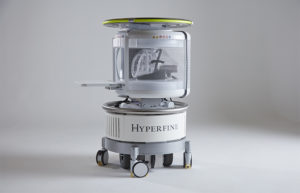
(Image courtesy of Hyperfine Research)
Research by scientists at Massachusetts General Hospital has led to the development of a portable MRI machine designed to safely and accurately operate at a patient’s bedside.
In a proof-of-concept study on 30 patients in the Yale Neuroscience intensive care unit (ICU), the machine produced important neuroimaging findings in 29 of critically ill patients they evaluated for suspected stroke, traumatic brain injury or other neurological problems. The findings jibed with conventional radiology findings in all but one case, according to the study, published online in JAMA Neurology.
“How can a portable low-field device that operates on a standard electrical plug change the paradigm?” said Dr. W. Taylor Kimberly, MD, chief of the division of neurocritical care at Mass General, in a news release. “It can bring the MRI to the bedside, and it can do so in a hospital environment where there is metallic material nearby, and can do it safely because the magnetic field strength is lower.”
The bedside MRI also detected abnormal neurologic findings in eight of 20 patients with altered mental status in a COVID-19 ICU.
Traditional MRI units are large, immobile devices containing heavy magnets made of super-conducting material that requires super-cooling with liquid nitrogen or helium. The high magnetic field strengths of standard MRI units (1.5 to 3 Tesla) require careful screening to ensure that patients have no ferrous metals in or on their bodies, such as medical implants, insulin pumps or shrapnel fragments that could cause serious injury during imaging. Medical equipment containing ferromagnetic components must be kept out of the MRI room.
The mobile MRI system trades some of the high-resolution imaging quality of a fixed MRI for portability and lower cost. The device contains a 0.064 Tesla permanent magnet that does not require cooling, and can be plugged into a single 110 volt, 15 amp outlet, making it suitable for use in settings such as emergency departments, mobile stroke units and regions with limited medical resources. The lower-strength magnetic field does not interfere with metal-containing equipment in patient care units, according to the researchers.
The system grew out of work that researcher Matthew S. Rosen began more than a decade ago at the request of the U.S. Department of Defense (DoD). DoD staff were concerned that soldiers with battlefield injuries might have shrapnel in their heads that could cause serious injury or death if they were placed into a high-field scanner. Rosen is now director of the Low Field MRI and Hyperpolarized Media Lab and co-director of the Center for Machine Learning at the Athinoula A. Martinos Center for Biomedical Imaging at Mass General.
Rosen and serial inventor/entrepreneur Jonathan Rothberg of Yale University co-founded a company, Hyperfine Research, to commercialize the portable MRI system and licenses some technology from Mass General. The device received FDA 510(k) clearance in August. Their study was supported by funding from the American Heart Association.
“This is an enabling technology to bring non-invasive neuroimaging with the soft-tissue contrast and all of those things neurologists have been relying on for years to environments where it otherwise would not be possible,” Rosen said.




